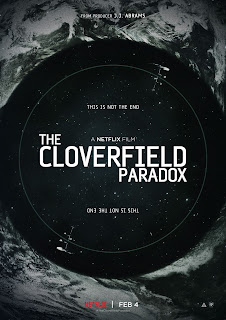The Cloverfield Paradox
A couple years back, 10 Cloverfield Lane was released around the globe. It was pretty much a rather strong hit with critics and fans alike, who appreciated its mysterious thriller type vibe, which was a bit of a detour from the monster film that was the original Cloverfield. However, I was not a fan. I rather enjoyed the original aspect of 2008's Cloverfield, and that's what I was expecting from its sequel, and I did not like how it decided to swap up genres on me.
Nowadays, I look back in shame thinking that I looked at the movie wrong. Rather than looking at the genre of the film, I should have realized it was doing something a bit more bold: it was setting up a whole universe, or multiverse, and I thought the idea of looking at different characters' events during the Cloverfield attack was an interesting idea. At least, that's what I thought, as it turns out I might be wrong once again, as proven by this year's Netflix special The Cloverfield Paradox.
Paradox in itself has a bit of an interesting story to tell just in its development. For years, the movie was promised to us in 2017 under the name God Particle, which was supposed to be loosely based in the Cloverfield universe, only this time it was set in space. Then a lot of the information stopped coming, and it was nothing but radio silence...I, myself, nearly gave up on it. But, then all of a sudden, in late 2017, we got a rapid flush of news regarding renames and new companies taking up the rights for distribution. Eventually, Netflix had it and promised to release it on their service.
Then, on the night of the Super Bowl this year, suddenly, we had it. The Cloverfield Paradox was in our reach. But was it really worth all that fuss?
In a short answer, no. When you watch Cloverfield Paradox, you can see why it was stuck in development hell for so long. There's so much that's trying to be achieved by this two hour movie, that all of its stringed-up plot points seem disjointed and unfamiliar. At random points in the film, new problems will spark up that hardly ever get fixed or mentioned again, leaving most of it for audiences to figure out, and while it's not a bad idea for films to not force feed everyone all the time, it's really difficult when the rest of the film is force feeding the audience EVERYTHING.
Seriously, most of the issues and ways of resolving these problems are explained to the audience through dialogue, there's even a scene where the next thing to do is literally written down for everyone. It's so hamfisted and feels like such a departure from the rest of this franchise that always had this aspect of cleverness to it, all thrown away by this stupid straight-to-Netflix deal.
Now, you're expecting me to say that a lot of this can be redeemed by certain aspects of the film. I can say that there are some good things here, it does do a lot of world-building, setting up some interesting theories as to why Cloverfield happened in the first place. Also, the cast does try to do their best with what they're given, especially some favorites like Daniel Brühl and Elizabeth Debicki. The technical aspect is also decent, with some beautiful direction and some decent CGI. But this is all really minor stuff that can't fix the biggest issues at stake here, I'm sorry to say.
And I can say for sure, I don't think I'm wrong about this one. It tries very hard to do a lot of things, some interesting, some dumb, but maybe it would have been better off if Cloverfield Paradox was left in development hell. I'll give it a 4.9/10.



Comments
Post a Comment